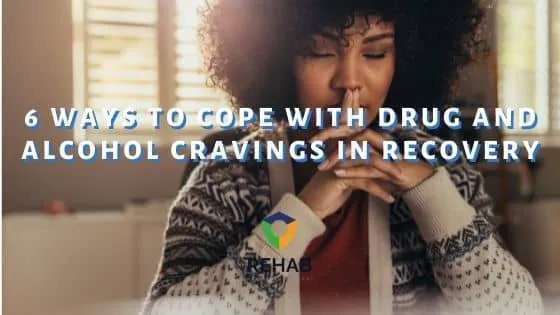Table of Contents
Addiction to drugs and alcohol can cause severe damage to a person’s physical health, emotional wellbeing, relationships, and many other parts of their life. Many people require professional treatment to overcome addiction and learn how to live a healthy, fulfilling life.
But going to treatment isn’t the end of a person’s journey with addiction. Because addiction can’t be cured, people must find ways to stay committed to sobriety. This can involve things like participating in therapy, joining support groups, and getting regular medical care. For many, it also means finding effective ways to cope with cravings.
Without having the skills to cope with them, drug and alcohol cravings can derail a person’s progress and can lead to a relapse. There are many ways to cope with cravings. Practicing these six skills can help people avoid relapse and stay focused on their sobriety.
1. Distractions
Cravings can come on strong and be intense, but they usually subside in a short period. Knowing this can help you avoid giving in to them. Finding a distraction can be helpful when you experience cravings. This can be calling a friend, having a snack, going outside, playing or listening to music, or any other activity that can keep your mind and body occupied until the craving passes.
Some people find that being active is especially helpful when managing cravings. This may be because people often need an outlet for anxiety, frustration, or other strong emotions that sometimes go along with cravings.
2. Exercise To Cope With Cravings
Exercise is an effective tool to cope with drug and alcohol cravings. Doing some moderate exercise can help boost your mood, lower stress, and is a great distraction. Exercising outdoors may have even more mood-lifting benefits. You don’t need to run great distances or do any intense strength training, either. Walking, swimming, biking, or doing yoga can be enough to help you cope with cravings.
3. Test Your Thoughts
Sometimes when cravings hit, people panic or feel overwhelmed. You may think that you can’t resist the craving or tell yourself it will last forever. It can be helpful to test those thoughts and remember that these thoughts aren’t true.
When a craving arises, take a few deep breaths and remind yourself that people can resist cravings, that you’ve done it before, and that the craving will get less intense and then go away in time. In time and with some experience, you will feel more confident that you can cope with cravings without relapsing.
4. Practice Mindfulness
Mindfulness is the practice of calming your mind through activities like slowing your breathing and focusing your mind on something calming. When a craving starts, you can get back in control by taking deep breaths or actively changing your thoughts.
Instead of giving in to the panic or anxiety that comes along with a craving, you can ask yourself questions that help you stay focused on the present moment. You might focus on what the craving feels like. What sensations do you feel in your body? Where do you feel them? Try to approach the craving with curiosity instead of judgment. Try to get to the point where you can believe that the craving isn’t bad, it just exists. By practicing mindfulness, you can cope with cravings until they pass and avoid relapse.
5. Remove Yourself From the Situation
Sometimes the best thing you can do is to leave the place you are when the craving strikes. Triggering people, places, and situations can trigger cravings–sometimes unexpectedly. If you are faced with a triggering event and a craving strikes, you can simply leave. Don’t worry about what others think. Your recovery is the most important thing.
6. Think About What Comes Next
Thinking about what would happen next if you were to give in to your drug and alcohol cravings can help you make a healthy decision in a tense moment. Sometimes this is called “playing the tape”. It essentially means to imagine what the consequences would be if you were to relapse. You can imagine the disappointment or frustration you might feel. You could imagine the consequences to your health, safety, and relationships.
You may also imagine how you’ll feel tomorrow if you don’t give in to your cravings. Sometimes thinking about the pride, relief, and satisfaction you’ll feel can help you make a healthy choice in the midst of a craving.
Learn How to Cope with Drug and Alcohol Cravings By Contacting Rehab Recovery Centers
People living with addiction or who are in recovery need high-quality treatment and support. The specialists at Rehab Recovery Centers will work to verify your insurance, recommend the right level of care, and connect you with the programs and professionals that will help you overcome addiction. We make the admission process as easy as possible so you can focus on what matters most: your recovery.
If you have been waiting to get the treatment you need, don’t wait another day. Reach out to the professionals at Rehab Recovery Centers today.
Get Help Today
Don’t go through the process of recovery alone. There are people who can help you with the struggle you’re facing. Get in touch with one today.


